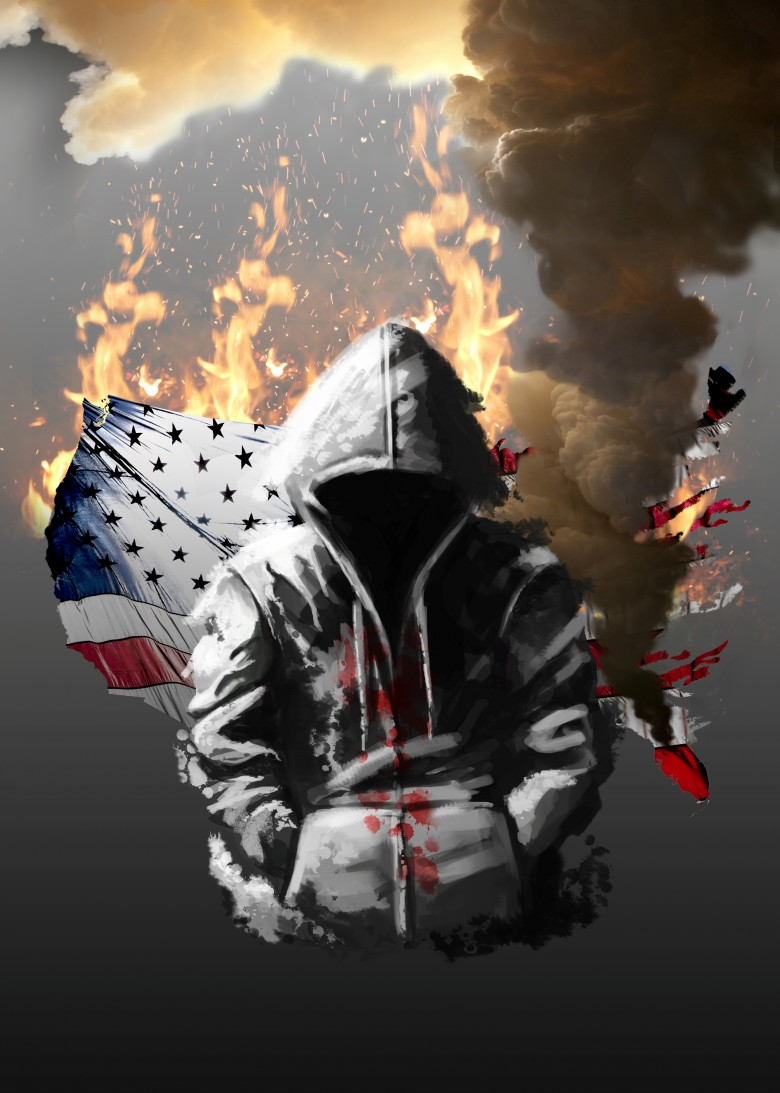The new play by Gary Earl Ross at Subversive Theatre, “The Trial of Trayvon Martin,” may be a fantasy, but the themes presented are very much of the real world and of the present time – race in America, domestic violence, and our aggressive legal system that targets minorities. Mr. Ross captures the issues of the day and the effects on the lives of the people involved.
“The Trial of Trayvon Martin” tells the tale of what might have happened had Trayvon Martin (Brian Brown) killed George Zimmerman (Rick Lattimer) that night in Florida in 2012, and been subsequently brought to trial, rather than the other way around. How might Trayvon, the police, and the district attorney have responded? How might the trial have unfolded?
The minimalist set has three tall, translucent screens set at angles on a bare floor. We see Trayvon walking in the dark and putting on his hoodie as thunder claps and it begins to rain. A shadowy figure is behind one of the screens watching him. Is there a gun? Trayvon is on his cell phone talking to his friend Rachel. A voiceover responds to him as he walks along, becoming more and more concerned about the man following him. As George confronts Trayvon and reveals his gun, a scuffle ensues and George is killed. Trayvon, horrified, runs away. And then…
While events unfold as one might expect in a police procedure/courtroom drama, with Trayvon being arrested and eventually tried, the real drama of the play lies in the lives of the players - who they are and what some of them have endured.
In a compelling trial scene, Trayvon’s father, Tracy (Leon Copeland), tells the jury how he has instructed his son to behave in public so he will not draw attention to himself and be arrested or killed. As he cries out at the injustice of it, he reveals what he has endured over a lifetime. In another very realistic and powerful scene, George confronts his wife, Mickey (Brittany Noel Bassett), about flirting with other men. His anger escalates as he questions and accuses her. She becomes more and more frightened and finally is terrified.
Shawnell Tillery is excellent as Trayvon’s attorney, Imani. She is tough and knowledgeable, undaunted by the system she knows only too well. She is fierce in her beliefs and in her defense of Trayvon. Lawrence Roswell brings old cop wisdom to his role as Detective Hooks, who knows how this is going and that there is no stopping the steamroller once it is set in motion. His talks with Anita (Kunji Rey), the District Attorney, about the weakness of her case and the possibility that Trayvon is telling the truth about how George was killed, fall on deaf ears. Anita knows a high profile, career-making case when she sees one and does not give an inch in her determination to bring Trayvon to trial and conviction. She uses every trick in the book, including bullying Trayvon’s friend Rachel, at trial.
Rachel (Kajana Stover) is a shy, frightened young woman, easily cowed. Mr. Lattimer gives us a scary, tortured soul in George. His cry that he wants to be important tells us a great deal about his anger and rage and the lengths to which he will go to overcome his feeling of being a nobody. Ms. Bassett, very good in her role, shows both sides of the abused spouse – her fear of her husband and her defense of him. “He was a good man. He loved me very much,” she says. Mr. Brown as Trayvon seems at times a very small figure in a very large drama swirling around him. He is, after all, just a kid who was walking home from the store when he was swept up into the maelstrom that is the American legal system. Rounding out this very good cast is Michael Mottern as the Officer/Bailiff, looking very much the beefy redneck cop he portrays. One more cast note – the unknown person who is the disembodied voice of the Judge is terrific. She is the only comic relief in an otherwise very serious play, at the same time being very clear about who is in charge.
Kurt Schneiderman, who directs, must have been very pleased when he read the script for this play, as it speaks to the mission of The Subversive Theatre Collective: to provide entertainment that is socially-relevant and provocative. Witness the very last scene. He keeps his cast on point, and the action moving right along. I particularly like his juxtaposition of Anita/Mickey and Imani/Rachel while the lawyers question the women about their men. It is very effective in revealing the differences in their lives. In the closing arguments scene, having the two lawyers speak over each other at times adds to the drama of the end of the trial and the shortness of the play, which comes in at just under two hours.
When the trial is over, Anita asks Imani why she does what she does. One of the things Imani points out is that in literature the perception is that “people are white unless otherwise specified.” She says that “we” - people of color - are not “other.” In a very heartfelt monologue, she speaks of her commitment to changing that perception.
No one knows what would have happened if Trayvon had killed George instead of the other way around. But we do know what happens all too often when there are “incidents” between black and white. We have only to pick up a newspaper almost any day of the week to glean that information. This play opens a window into what happens after the incidents - in the legal system and in the lives of the people involved, to their families, and friends.
The Trial of Trayvon Martin
Fri Apr 7th → Sat May 6th
Days: Thu, Fri, Sat

